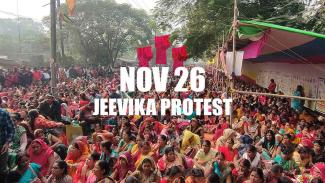The National Rural Livelihood Promotion Mission (NRLM) is a program run by the Ministry of Rural Development. The State Rural Livelihood Promotion Mission (SRLM) is run in each state under the central scheme of NRLM. In Bihar, it is commonly referred as Jeevika and functions under the control of the government’s Rural Development Department. The scheme is run with the declared purpose of creating self-employment opportunities for the unemployed rural women in India.
The Jeevika Mission mainly consists of two categories of personnel: firstly, the officers and employees (Jeevika Cadres) who work on a contractual basis and receive a monthly honorarium determined by the Jeevika Mission; The second category of people involved in the Jeevika Mission are the volunteers of self-help groups formed at the village level, who do not receive any kind of payment.
The financial support for the state Jeevika Mission (SRLM) comes from several sources, primarily the central budget under the NRLM, the World Bank, and various international and national non-governmental financial institutions. Reports indicate substantial misuse and wastage of Jeevika Mission funds, which is shielded by higher-level officials.
On September 2, 2024, the Bihar State Livelihood Mission issued an arbitrary order stating that the monthly honorarium payments to Jeevika Cadres would decrease by 20% every two years starting from June 1, 2024, and would become zero by June 1, 2028. The order explicitly stated that the responsibility for paying the honorarium would now fall on the respective community organisations, which are already in a precarious financial situation. This means that the payment for the contract-based Jeevika Cadres would depend on contributions from village based self help groups. This is completely illogical, impractical, and unjust.
The Jeevika union leaders said that the Nitish Kumar government is exploiting Jeevika workers for political gains while failing to address their economic and social security needs. “The so-called ‘double-engine’ government has used Jeevika workers extensively, but now, instead of fulfilling its obligations, it is pushing these workers and SHGs into the clutches of private loan companies, moneylenders, and chit fund operators,” Sashi Yadav, leader of scheme workers said.
According to the data released by the Bihar Jeevika Mission on July 9, 2024, 18,466 Self Help Groups (SHG) have fallen into the Non-Performing Assets (NPA) category, and 144,257 into the Pre-NPA category. Consequently, the directive to place the entire burden of honorarium payments on financially unviable SHGs implies the conversion of contract-based Jeevika Cadres into commission agents on the one hand and to institutionalise the exploitation of their labour, and to gradually dismantle this ambitious project that is aimed at providing livelihood for rural women. This is the reality of Bihar CM Nitish Kumar's ‘self-reliance’ narrative, which he has so dearly copied from PM Modi.
Naturally, this arbitrary order has sparked outrage among the already marginalised and distressed Jeevika Cadres. The Jeevika cadres organised under the banner of Bihar Pradesh Jeevika Cadre Sangh have given prior notice to central rural development ministers, the Chief Minister of Bihar, the departmental minister, and associated higher officials, to withdraw this arbitrary order. Around 150,000 Jeevikas have gone on an indefinite strike since September 9, 2024, which continues till date. However, the Bihar CM Nitish Kumar, who has been continuously using the Jeevika Cadres and self-help group women to run governance obligations and thereby to stay on political power, has not only refused to address the demands of the striking workers but has also declined to meet their union representatives. This attitude of the Nitish government has exposed the class character of his administration among Jeevika Cadres and women associated with self-help groups.
The CPIML raised the issue of Jeevikas during the ‘Badlo Bihar Nyay Yatra’ that has traversed all across Bihar from October 16 to 25. AICCTU has urged the government to engage in meaningful dialogue with the union representatives without further delay. The Union has announced a protest on 26 November in Patna during the winter session of the Bihar Assembly. The protest aims to draw attention to the Bihar government's decision to phase out honorariums for Jeevika cadres, a move the union said is part of a broader plan to dismantle the Jeevika programme under pressure from private microfinance companies.
The major demands of Jeevikas in Bihar include to scrap the arbitrary order declining the honorarium, provide appointment letters and identity cards to all cadres of Jeevika mission, a minimum monthly honorarium of Rs. 25,000. Jeevika workers have criticised the government for issuing threats of dismissal for asking their due rights. Other demands also include Rs. 3,000 as a field travel allowance, meeting allowances of Rs. 500 for all presidents, secretaries, and treasurers at the Cluster Level Federation (CLF), Rs. 300 at the village organisation level, and Rs. 200 at the self-help group level, along with a 50% increase in travel allowances. The Jeevika union also demands waiver of loans of all SHGs that are five years old, besides a promotion system for them after completing three years in the project and social security benefits, leave, special leave for women cadres,Rs. 2 lakh medical claims, and Rs. 5 lakh death claims for all cadres.










